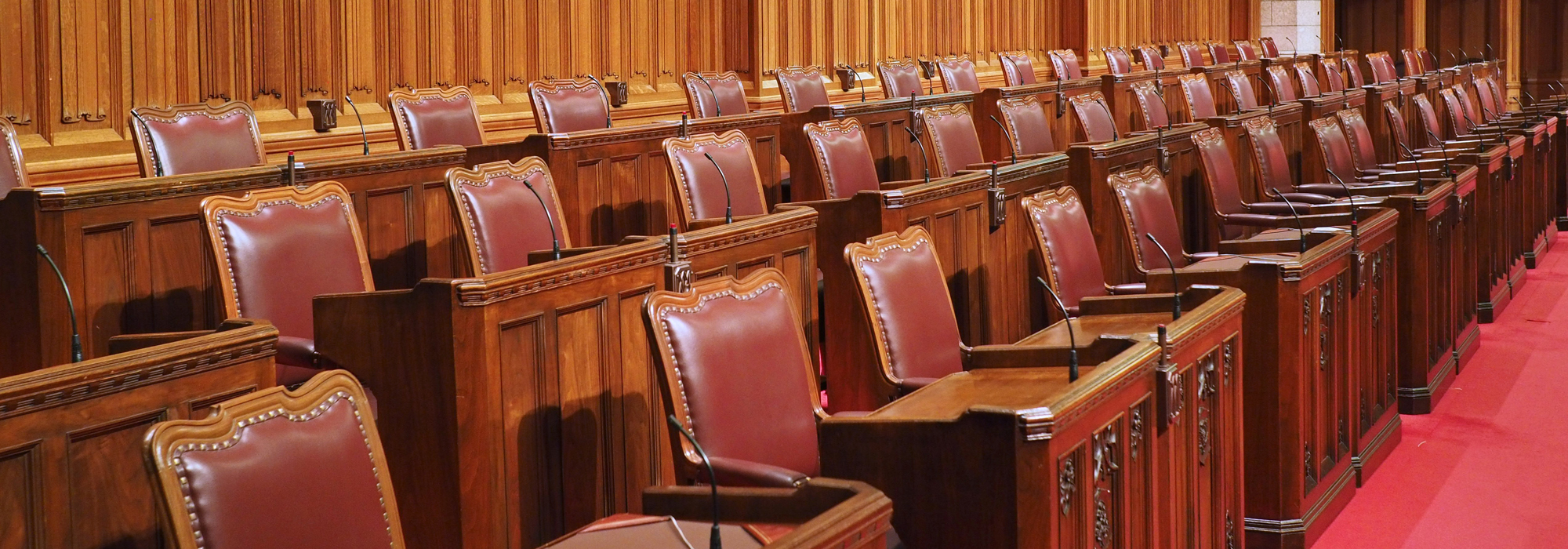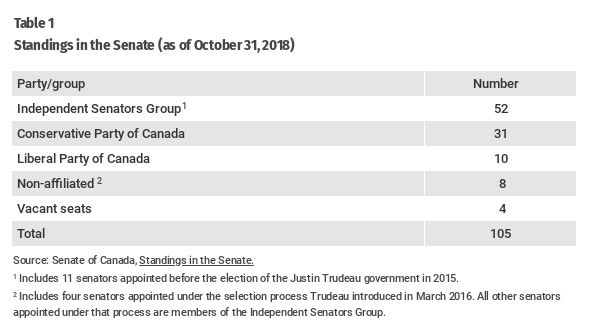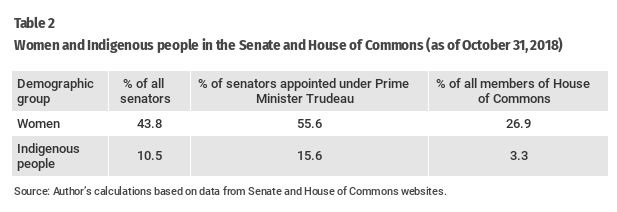
In less than three years, the Senate of Canada has been significantly renewed — largely as a result of Prime Minister Justin Trudeau’s decision to fill vacancies with candidates proposed by an independent advisory board. Although those chosen for the first seven such appointments in March 2016 were selected by the advisory board, candidates since then have come from pools of interested Canadians who submitted an application. With 52 members, the Independent Senators Group (ISG) now has a slight majority of the currently filled Senate seats (see table 1).
The Senate’s renewal extends beyond its membership. There have been changes to procedural practice and to the way committee members and chairs are chosen. More important, the Senate has become more active in proposing amendments to government legislation.
What is the significance of the renewal? Has the Senate become more independent? Is it now more representative of Canadian society? These and other questions were addressed at a round table sponsored by the Institute for Research on Public Policy (IRPP) on September 27, 2018. Participants included a number of senators, senior officials from the Senate and some federal government departments, and leading academics.
Taking stock of the renewal
What some see as the Senate’s new-found independence is reflected in a greater tendency to press for amendments to legislation. Between the start of the present parliamentary session in December 2015 and the end of June 2018, the Senate proposed amendments to 14 bills that originated in the House of Commons. During the entire 2011-15 Parliament, the Senate attempted to amend only two such bills.
Some of the bills the Senate amended (successfully or not) were adopted after extensive interactions involving the Senate, the House of Commons, government departments and stakeholders. The most high-profile example is Bill C-45, the marijuana legalization bill. It was expected that the Senate would review this legislation particularly attentively and probably call for amendments. Before Bill C-45 arrived in the Senate, Senator Peter Harder, the Government Representative in the Senate, published a detailed report about the Senate’s complementary constitutional role. It discussed the Salisbury Convention on the relationship between the British House of Lords and House of Commons. The convention provides that the Lords do not oppose the second or third reading of bills that are based on commitments the governing party made in its election platform.
The Senate returned Bill C-45 to the House of Commons with 46 amendments (some of which originated with the government). The House of Commons rejected 13 of the proposed changes, including a provision that would have allowed the provinces to ban home cultivation of marijuana. Quebec and Manitoba wanted to forbid their residents from growing recreational marijuana at home. When the bill was returned from the Commons, senators did not insist on that amendment or any of the others the government had rejected. Judging from various comments in Senate debates, acceptance of at least the spirit of the Salisbury Convention was probably a factor in this outcome.
In a number of cases, following debate in the Senate and its committees, the government has offered concessions that do not appear in legislation. For instance, on Bill C-45, Indigenous Services Minister Jane Philpott and Health Minister Ginette Petitpas Taylor promised (in a letter) that the government would report to the Standing Senate Committee on Aboriginal Peoples within 12 months of legalization on steps it has taken to address concerns from Indigenous communities. This is one example of how the Senate is making greater use of what some have labelled “soft power.” In this regard, the senior political scientist Paul Thomas suggested at the IRPP round table that the Senate should seek influence through scrutiny, advice, publicity and persuasion rather than by relying on the “hard power” of attempting to defeat, amend in fundamental ways or prolong unduly the passage of government bills already approved by the Commons.
David Smith, one of Canada’s leading constitutional scholars, stated in his round table presentation that there is no doubt that the Senate is improving legislation. It is fair to say that, in doing so, it has become somewhat more independent. However, there is relatively broad agreement that its constitutional role can be accurately described as complementary to that of the House of Commons. Put another way, there has not been a marked departure from what was envisaged during the pre-Confederation debates and from the way the Senate has usually carried out its legislative review function.
As for the Senate’s representativeness, there has been a notable improvement on two dimensions. As of October 31, 2018, 56 percent of the senators appointed under Trudeau were women and 16 percent were Indigenous. As a result, 44 percent of the 105 Senate seats are filled by women and 11 percent by Indigenous people. In both cases, the proportion is considerably higher than in the House of Commons (see table 2). (Indigenous people accounted for 5 percent of the Canadian population in 2016.) As Senator Ratna Omidvar observed at the round table, the Trudeau Senate appointments are leading to “a more inclusive and complete picture of this country.”
In this context, a number of informal groups have emerged within the ISG. There is a group that focuses on gender issues as well as an Indigenous “collective.” According to one Senate adviser, the latter is the most influential informal group in the Senate. In this regard, Emmett Macfarlane has suggested that the Senate may become an increasingly important site for Indigenous activism.
Continuing the renewal process
A number of the senators appointed under the new process have been very active in Senate and public debates on a number of government bills. Many of them bring considerable expertise to the legislative review function, and it is not surprising that they would want to make their mark — and demonstrate independence of spirit.
So far, the ISG senators have not been particularly active in carrying out one of the functions for which the Senate has often been given credit: undertaking in-depth studies through special committees. Examples include the special committees on the media, poverty and aging. At present there are three special Senate committees: on Senate modernization, the Arctic and the charitable sector (the latter two were proposed by Liberal senators). The Senate’s standing committees can undertake studies, but special committees allow for more in-depth examination of issues that do not fit within the mandate of a particular standing committee. It is to be hoped that senators from the ISG, which now has the numbers to counter procedural obstacles, will become more active in championing special committee studies on key public policy issues.
A concrete way of consolidating the renewal would be to update the Parliament of Canada Act, which still reflects the historic government-opposition divide in the second chamber. For example, the Act currently provides for additional remuneration for five government and five opposition leadership positions: leader, deputy leader, whip, deputy whip and caucus chair. Senator Harder receives the allowance for the government leader in the Senate; Senator Diane Bellemare, Legislative Deputy to the Government Representative, is paid the deputy leader’s allowance; and Senator Grant Mitchell, styled Government Liaison, receives the government whip’s allowance. (Senators Harder, Bellemare and Mitchell are all non-affiliated senators.) A glaring anomaly is that Senator Yuen Pau Woo, the facilitator (de facto head) of the ISG, receives no such allowance, nor do any of the other senators who hold leadership positions within the ISG. The allowances continue to be paid to the senators who occupy the five positions within the Conservative caucus (which has 31 members, compared with 52 for the ISG).
Senator Harder has invited senators to make recommendations to the government for changes to the Act. The Special Committee on Senate Modernization has discussed the matter on more than one occasion but has not issued a report. Although ideally the government should act on recommendations with broad support among senators, the complexity of the issues and resistance from Conservative senators are significant obstacles. (Conservative Leader Andrew Scheer has said that, if elected prime minister, he would revert to the previous Senate selection method.)
Senator Woo has stated that the road map for further Senate renewal “depends on Trudeau to finish the job.” If modernization of the Parliament of Canada Act is not feasible in the pre-election climate, the Liberal Party of Canada should include a commitment along these lines in its platform for the 2019 election. This would underline what seems self-evident: namely, that Senate renewal was not achieved when the new selection process was launched but should be seen as an ongoing process.
In a Nanos survey conducted in March 2018, 48 percent of respondents indicated that the Senate is functioning the same as it did five years ago; 18 percent said that it was functioning better and 15 percent that it was functioning worse. It will take time for Canadians to understand the implications of a renewal that has, after all, moved quite quickly. The media could help by extending its coverage of Senate activities beyond disagreements over government legislation.
Finally, the senators appointed under the new system need to draw on the qualities that led to their nomination in order to strengthen the way the Senate performs its various functions. They have the potential to make Canada’s complementary second chamber more relevant and better appreciated.
Photo: Shutterstock/By Spiroview Inc
Do you have something to say about the article you just read? Be part of the Policy Options discussion, and send in your own submission. Here is a link on how to do it. | Souhaitez-vous réagir à cet article ? Joignez-vous aux débats d’Options politiques et soumettez-nous votre texte en suivant ces directives.









